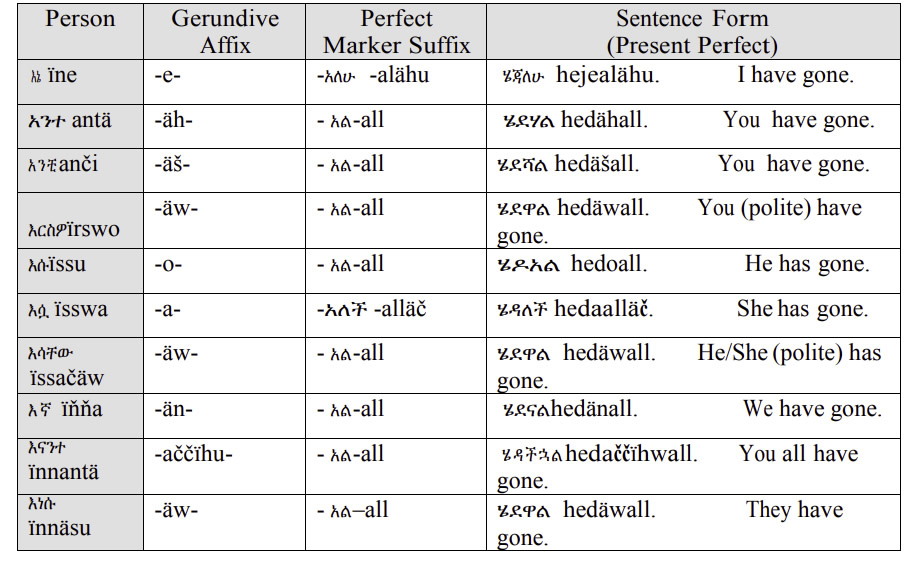Language/Amharic/Grammar/The-Present-Perfect-Tense
Rule
The present perfect tense usually indicates something that has happened in the past (often in the near past), something that has been ‘perfected’, as it were, but also some effect on the present. This tense is usually expressed in English by, “have” or “has” done something, as in, “I have arrived”.
Dialogue
Look at the following question and answer exchanges:
A: ቡናው አልደረሰም እንዴ? bunnaw aldäräsäm ïnde? B: ደርሷል därsoal. ደርስ därs + ኦ o + አል al It is ready. (Lit It has arrrived.) [ይደርሳል yïdärsal (future)] A: ታክሲው አልመጣም? taxiw alïmät’am? B: መጥቷል mät’ïtoal. መጥት mät’ït + ኦ o + አል al It has come. [ይመጣል yïmät’al (future)] A: አስቴር አልሄደችም? Aster alhedäčïm? B: ሄዳለች hedaläč. ሄድ hed + አ a + ለች aläč She has gone. [ትሄዳለች tïhedaläč (future)]
Note
Note that the whole sentence ‘ደርሷልdärsoal’ = root(stem) + ኦ o + አል al, has two suffixes. The first suffix, i.e. ‘o’, marks the subject ‘he’; the second indicates present perfect.
Present Perfect Forms of መሄድ mähed [ሄደ hedä] (to go)
Points to Note:
- You can see from the table below that the present perfect marker is - አል–all, except for in the ‘I’ and ‘she’ forms.
- If the verb stem ends in a consonant that palatizes, such as in –hed- above, this consonant will palatilize in the first person “I” form: hejeaalähu.
- Notice in the question-response examples given above that the verb mämt’at [mät’a] “to come”, adds a “t” after its verb stem to form “mät’ït.” There are complicated rules as to when this is done, but as a rule of thumb, if the infinitive adds a “t” to the end, the gerundive will also add a “t”.
- መስማት mäsїmat ☛ ሰምቶአል sämtoal He has heard.
- መግባት mägїbat ☛ ገብተናል gäbtänal We have entered.
- መስጠት mäsїt’ät ☛ ሰጥተሻል sät’ïtäšal You (f.) have given.
In the first person “I” form, the combination of “t” + “e” becomes palatallized to “ïčč”:
- መግባት mägїbat ☛ ገብቻለሁ gäbïččalähu
- መስማት mäsїmat ☛ ሰምቻለሁ sämïččalähu
- መጠጣት mät’ät’at ☛ ጠጥቻለሁ t’ät’ïččalähu
Source
https://www.livelingua.com/peace-corps/Amharic/Amharic%20Peace%20Corps%20Language%20Manual-2015.pdf


